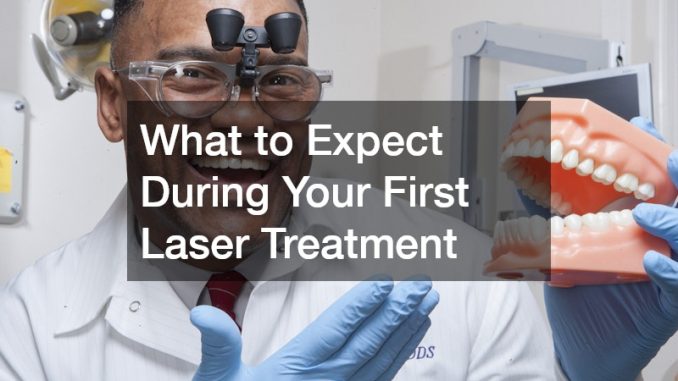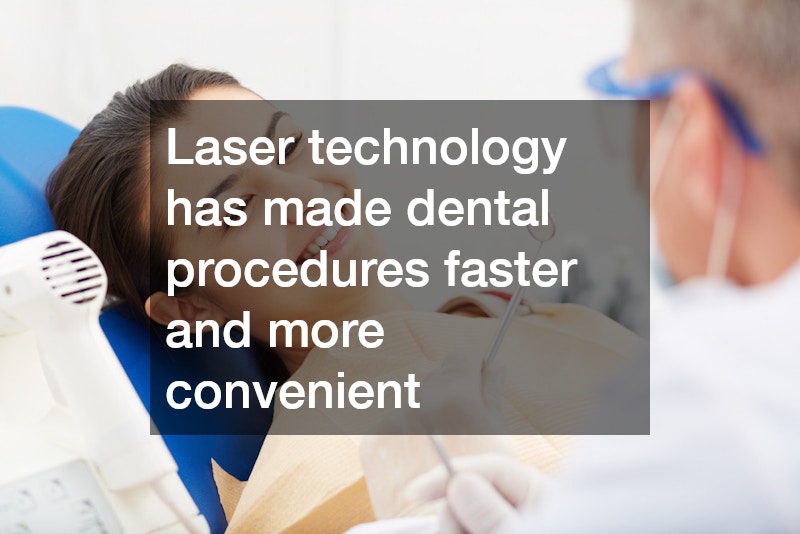

Laser dentistry has emerged as a cutting-edge alternative to traditional dental treatments, offering numerous benefits that make it an appealing option for many patients. As more people become aware of this technology, questions often arise about whether it’s the right choice for their specific dental needs. In this article, we’ll explore who can benefit most from laser dentistry, what to expect during your first treatment, and key questions to ask your dentist before deciding if this innovative approach is right for you.
What Is Laser Dentistry?
You might be wondering, “is there a dentist near me that uses lasers?” You’d be surprised at how many have adopted this development in dental treatment technology. Laser dentistry is a modern approach to dental care that uses focused light beams to perform a variety of dental procedures. Unlike traditional methods that rely on drills and other mechanical tools, lasers offer a minimally invasive way to treat both hard and soft tissues in the mouth. This technology can be used for a wide range of treatments, from removing decay and reshaping gums to treating cavities and whitening teeth. Understanding how laser dentistry works can help you appreciate its benefits and determine if it’s suitable for your dental care.
- Types of Lasers Used: Dental lasers are generally divided into two categories—soft tissue lasers and hard tissue lasers. Soft tissue lasers are used for procedures involving the gums, such as reshaping gum lines or removing diseased tissue, while hard tissue lasers are used for cutting teeth and bone.
- How It Works: The laser’s light beam precisely targets the treatment area, minimizing damage to surrounding tissues. This precision allows for more controlled and efficient procedures, often with less discomfort for the patient.
- Common Applications: Lasers can be used in a variety of dental procedures, including cavity detection, teeth whitening, gum disease treatment, and even complex surgeries. Their versatility makes them a valuable tool in modern dentistry.
Benefits of Laser Dentistry
Laser dentistry offers several significant advantages over traditional dental techniques, making it a popular choice for patients seeking a more comfortable and efficient treatment experience. One of the primary benefits is that laser dentistry is less invasive, often resulting in reduced pain and quicker recovery times. Additionally, lasers provide greater precision, which not only improves the effectiveness of the treatment but also reduces the risk of damage to surrounding tissues. These benefits can make laser dentistry an attractive option for many patients.
- Minimally Invasive: Laser dentistry often eliminates the need for drills or scalpels, making procedures less invasive and more comfortable for patients.
- Reduced Pain and Discomfort: Many patients report feeling less pain during and after laser treatments compared to traditional methods, with some procedures requiring little to no anesthesia.
- Faster Healing and Recovery: Because lasers cause less trauma to the tissues, the healing process is typically faster, allowing patients to return to their normal activities sooner.
- Reduced Bleeding and Swelling: Lasers can cauterize blood vessels during treatment, leading to less bleeding and swelling, which further contributes to quicker recovery times.
- Precision and Accuracy: The precision of laser technology allows dentists to target specific areas without affecting surrounding tissues, improving the accuracy of the treatment.
- Lower Risk of Infection: Lasers sterilize the treatment area as they work, reducing the risk of infection and promoting better overall healing.
Is Laser Dentistry Right for You?
Determining whether laser dentistry is right for you depends on several factors, including your specific dental needs, your tolerance for traditional dental tools, and your budget. Laser dentistry can be particularly beneficial for patients who experience dental anxiety or discomfort with traditional methods, as well as those looking for a quicker and less painful recovery. However, it’s important to consider that laser dentistry may not be suitable for all dental issues, and there are some limitations to what lasers can achieve. Consulting with your dentist can help you make an informed decision.
- Who Can Benefit from Laser Dentistry?: Laser dentistry is ideal for patients with dental anxiety, those who prefer a more comfortable treatment experience, and individuals with conditions like gum disease or soft tissue lesions.
- Patients with Dental Anxiety: If you’re nervous about the sounds and sensations associated with traditional dental tools like drills, laser dentistry offers a quieter, less intimidating alternative.
- Ideal Conditions for Laser Treatment: Laser dentistry is highly effective for treating gum disease, cavity removal, and other soft tissue procedures, making it a good option for these specific conditions.
- Gum Disease: Lasers can precisely remove diseased tissue and bacteria, promoting healthier gums and reducing the need for more invasive surgery.
- Cavity Treatment: Lasers can remove decay and prepare the tooth for a filling without the need for drilling, offering a less painful and more efficient process.
- Limitations and Considerations: While laser dentistry has many advantages, it’s not suitable for all procedures. Large cavities, certain types of dental restorations, and some complex surgeries may still require traditional methods.
- Not Suitable for All Procedures: Discuss with your dentist whether your specific dental issue can be effectively treated with lasers or if traditional methods are more appropriate.
- Cost Considerations: Laser treatments can be more expensive than traditional methods, and not all insurance plans may cover them, so it’s important to consider the financial aspect as well.
What to Expect During Your First Laser Dentistry Treatment
Your first laser dentistry appointment will likely begin with an initial consultation, where your dentist will assess your condition and determine if laser treatment is the best option for you. If laser treatment is recommended, your dentist will explain the procedure, including what you can expect before, during, and after the treatment. Most patients find the experience to be less daunting than traditional dental procedures, with minimal discomfort and a quicker recovery time. Knowing what to expect can help alleviate any concerns and ensure a smooth and positive experience.
- Initial Consultation and Diagnosis: Your dentist will conduct a thorough examination of your dental health, including X-rays and other diagnostic tools, to decide if laser dentistry is appropriate for your needs.
- Personalized Treatment Plan: Based on your diagnosis, your dentist will develop a tailored treatment plan that outlines the procedure, expected outcomes, and any necessary follow-up care.
- Preparing for the Procedure: Preparation for laser dentistry is usually minimal, and your dentist will provide specific instructions if any are needed.
- Minimal Pre-Procedure Anxiety: Unlike traditional methods, laser procedures often require no special preparations, and many patients experience reduced anxiety knowing they won’t face the usual dental tools like drills.
- During the Procedure: Laser dentistry procedures are typically quick and involve minimal discomfort. Your dentist will use a laser device to target the treatment area, and you may feel a warm sensation or slight tingling.
- Use of Lasers: The laser precisely removes or reshapes tissue as needed, often without the need for anesthesia or with only local anesthesia in some cases.
- No Drills or Needles: For many procedures, lasers eliminate the need for drills and needles, making the experience more comfortable and less stressful.
- Post-Treatment Care and Recovery: After the procedure, your dentist will provide instructions on how to care for the treated area, but most patients can resume normal activities almost immediately.
- Quick Recovery Time: The minimally invasive nature of laser dentistry usually results in faster healing, with less pain and swelling compared to traditional methods.
- Follow-Up Appointments: Depending on the procedure, your dentist may schedule follow-up visits to monitor healing and ensure that the treatment was successful.
Questions to Ask Your Dentist Before Choosing Laser Dentistry
Before deciding on laser dentistry, it’s important to have an open conversation with your dentist to ensure that it’s the best option for your needs. Asking the right questions can help you feel more confident in your decision and better understand what the treatment will involve. Your dentist can provide detailed information about the procedure, including any potential risks, costs, and whether your dental insurance will cover the treatment. This informed approach will help you make the best choice for your dental health.
- Understanding the Procedure: Ask your dentist to explain how laser treatment will work for your specific condition and what the expected outcomes are.
- Experience with Laser Dentistry: It’s important to know how experienced your dentist is with laser treatments. Ask about their training and success rates with similar procedures.
- Cost and Insurance: Discuss the cost of the laser procedure and whether it’s covered by your dental insurance.
- Comparison with Traditional Methods: Request a comparison of laser treatment versus traditional methods in terms of cost, effectiveness, and recovery time to make an informed decision.
- Potential Risks and Side Effects: While laser dentistry is generally safe, it’s important to understand any potential risks or side effects that may apply to your specific situation.
- Informed Decision-Making: Ensure that you are fully informed about both the benefits and the possible downsides of laser dentistry before proceeding with the treatment.
Laser dentistry offers a modern, minimally invasive alternative to traditional dental treatments, with many benefits such as reduced pain, faster recovery times, and greater precision. However, it’s not suitable for everyone or every dental condition. By understanding how laser dentistry works, knowing what to expect during treatment, and discussing your options with your dentist, you can make an informed decision that best suits your dental needs. Whether you’re considering laser dentistry for its comfort, efficiency, or the potential for a quicker recovery, staying informed will help you achieve the best possible outcome for your oral health.
